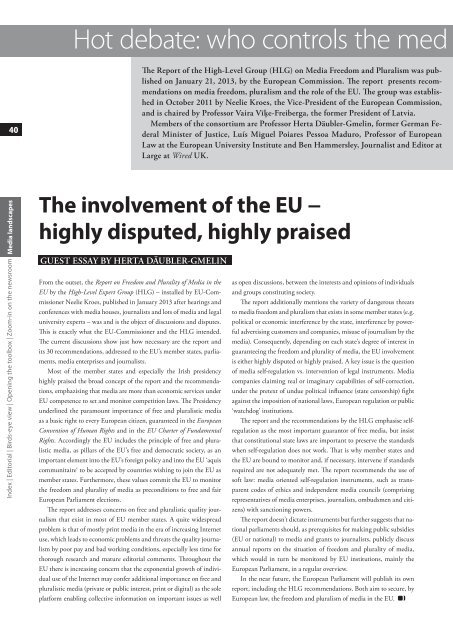MediaAcT
How fragile is media credibility? Accountability and transparency in journalism: research, debates, perspectives Final Research Report | Media Accountability and Transparency in Europe
How fragile is media credibility? Accountability and transparency in journalism: research, debates, perspectives
Final Research Report | Media Accountability and Transparency in Europe
Create successful ePaper yourself
Turn your PDF publications into a flip-book with our unique Google optimized e-Paper software.
Index | Editorial | Birds-eye view | Opening the toolbox | Zoom-in on the newsroom | Media landscapes<br />
0<br />
Hot debate: who controls the med<br />
The involvement of the EU −<br />
highly disputed, highly praised<br />
gueST eSSAy By herTA dÄuBler-gMelin<br />
From the outset, the Report on Freedom and Plurality of Media in the<br />
EU by the High-Level Expert Group (HLG) – installed by EU-Commissioner<br />
Neelie Kroes, published in January 2013 after hearings and<br />
conferences with media houses, journalists and lots of media and legal<br />
university experts – was and is the object of discussions and disputes.<br />
This is exactly what the EU-Commissioner and the HLG intended.<br />
The current discussions show just how necessary are the report and<br />
its 30 recommendations, addressed to the EU’s member states, parliaments,<br />
media enterprises and journalists.<br />
Most of the member states and especially the Irish presidency<br />
highly praised the broad concept of the report and the recommendations,<br />
emphazising that media are more than economic services under<br />
EU competence to set and monitor competition laws. The Presidency<br />
underlined the paramount importance of free and pluralistic media<br />
as a basic right to every European citizen, guaranteed in the European<br />
Convention of Human Rights and in the EU Charter of Fundamental<br />
Rights. Accordingly the EU includes the principle of free and pluralistic<br />
media, as pillars of the EU’s free and democratic society, as an<br />
important element into the EU’s foreign policy and into the EU ‘aquis<br />
communitaire‘ to be accepted by countries wishing to join the EU as<br />
member states. Furthermore, these values commit the EU to monitor<br />
the freedom and plurality of media as preconditions to free and fair<br />
European Parliament elections.<br />
The report addresses concerns on free and pluralistic quality journalism<br />
that exist in most of EU member states. A quite widespread<br />
problem is that of mostly print media in the era of increasing Internet<br />
use, which leads to economic problems and threats the quality journalism<br />
by poor pay and bad working conditions, especially less time for<br />
thorough research and mature editorial comments. Throughout the<br />
EU there is increasing concern that the exponential growth of individual<br />
use of the Internet may confer additional importance on free and<br />
pluralistic media (private or public interest, print or digital) as the sole<br />
platform enabling collective information on important issues as well<br />
The report of the high-level group (hlg) on Media Freedom and pluralism was published<br />
on January 21, 2013, by the european commission. The report presents recommendations<br />
on media freedom, pluralism and the role of the eu. The group was established<br />
in October 2011 by neelie kroes, the Vice-president of the european commission,<br />
and is chaired by professor Vaira Vīķe-Freiberga, the former president of latvia.<br />
Members of the consortium are professor herta däubler-gmelin, former german Federal<br />
Minister of Justice, luís Miguel poiares pessoa Maduro, professor of european<br />
law at the european university institute and Ben hammersley, Journalist and editor at<br />
large at Wired uk.<br />
as open discussions, between the interests and opinions of individuals<br />
and groups constituting society.<br />
The report additionally mentions the variety of dangerous threats<br />
to media freedom and pluralism that exists in some member states (e.g.<br />
political or economic interference by the state, interference by powerful<br />
advertising customers and companies, misuse of journalism by the<br />
media). Consequently, depending on each state’s degree of interest in<br />
guaranteeing the freedom and plurality of media, the EU involvement<br />
is either highly disputed or highly praised. A key issue is the question<br />
of media self-regulation vs. intervention of legal instruments. Media<br />
companies claiming real or imaginary capabilities of self-correction,<br />
under the pretext of undue political influence (state censorship) fight<br />
against the imposition of national laws, European regulation or public<br />
‘watchdog’ institutions.<br />
The report and the recommendations by the HLG emphasise selfregulation<br />
as the most important guarantor of free media, but insist<br />
that constitutional state laws are important to preserve the standards<br />
when self-regulation does not work. That is why member states and<br />
the EU are bound to monitor and, if necessary, intervene if standards<br />
required are not adequately met. The report recommends the use of<br />
soft law: media oriented self-regulation instruments, such as transparent<br />
codes of ethics and independent media councils (comprising<br />
representatives of media enterprises, journalists, ombudsmen and citizens)<br />
with sanctioning powers.<br />
The report doesn’t dictate instruments but further suggests that national<br />
parliaments should, as prerequisites for making public subsidies<br />
(EU or national) to media and grants to journalists, publicly discuss<br />
annual reports on the situation of freedom and plurality of media,<br />
which would in turn be monitored by EU institutions, mainly the<br />
European Parliament, in a regular overview.<br />
In the near future, the European Parliament will publish its own<br />
report, including the HLG recommendations. Both aim to secure, by<br />
European law, the freedom and pluralism of media in the EU.


